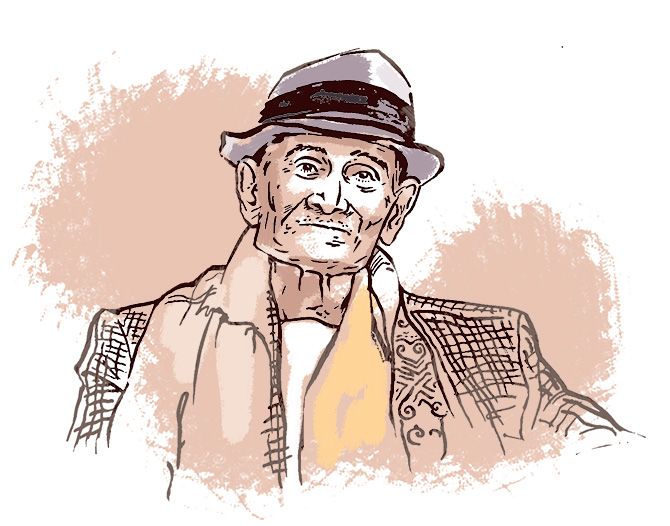Kanti Bhatt, respected Gujarati author and journalist, passed into the ages on August 4, 2019, at the age of 88.
In tribute, we reproduce an article his wife Sheela Bhatt wrote about him 19 years ago.
Illustration: Dominic Xavier/Rediff.com.

Kanti Bhatt, respected Gujarati author and journalist, who passed into the ages August 4, 2019, at the age of 88, was very, very widely read.
It is estimated that he contributed some 45,000 columns to various Gujarati-language publications like Chitralekha, Janshakti, Jansatta, Divya Bhaskar among others. His writing, which was said to be ageless, brought him a legion of fans.
His award-winning journalist wife, Sheela Bhatt, who was till recently Senior Editorial Director, News, Rediff.com, wrote this article 19 years ago, about her husband’s immense love for books.
Kanti, my husband, is not married to me.
He is married to books.
For the last 40 years, he has been collecting books. His mantra: beg, borrow or steal, but READ.
We live in a middle-class suburb of Bombay. Our house, full of books, must be an unusual sight to my neighbours.
After my marriage, when I first entered his house I found the teapot kept on an old edition of Mahavir Meri Drashtimain by Rajneesh. The wooden shelf in the kitchen contained old copies of The Book Digest, The Economist and The National Geographic.
On our first date, I remember, he had told me about Will Durant and Ariel, the authors of Age of Reason Begins. It seemed to me that he was quite influenced by Durant's passion for Ariel. Later, I was introduced to A Dual Autobiography, which the couple co-authored.
In the first week of my marriage, I met J Krishnamurti.
Again and again and again.
His lectures and books were in my bathroom, bedroom and balcony.
The funny thing was that whenever I opened any book from Kanti's collection my eyes always caught interesting paragraphs. Like this passage from Mary Lutens' biography of JK, Krishnamurti: The Years of Fulfillment:
"For years now, K has read very little apart from thrillers, Rex Stout and Fredrick Forsyth being among his favourite authors. During a flight he will look at The Reader's Digest and Time, and he immensely enjoys the jokes in The New Yorker. One of his chief pleasures is, and has always been, a good exciting film. The last film I went with him was The Raid on Entebbe. In the end he was shaking so much from excitement that he could hardly walk out of the cinema."
When one lives with books, one is privileged. Awesome personalities do not remain inaccessible.
Have you read The Paper Tigers by Nicholas Coleridge? It is about the wicked world of 25 powerful newspaper tycoons, from Rupert Murdoch to Sameer Jain of The Times of India.
Murdoch's portrait is a treat to read. In this book, legendary journalist and founder-editor of Blitz R K Karanjia narrates an experience:
"I went myself to his house one evening and Sameer (Jain) arrived one hour late. He had been proof-reading The Times of India and found that no page had less then 10 mistakes. Some had 20, one had 34. He was very angry about this!"
On another page Coleridge writes: "Aveek Sarkar is India's most sophisticated newspaper proprietor. He is magnificently rich, drinks only Grand Cru claret, smokes only Davidolf cigars, accepts only Bolivian coffee, has his silk underwear made in Lahore, and insists on having his suits made there as well because the tailoring is so superior to Savile Row!"
The book revealed another interesting detail: that Sarkar presented former Pakistan prime minister Benazir Bhutto an M F Husain painting as wedding present. It showed her father being hanged.
No doubt, books are universes. It's been 22 years since Kanti told me Durant's love story. The romance of books has passed me by, but the love and need for books remain in me.
We read in order to live. We read to face the insecurities of life. Reading adds to one's independence. As a reader I am not bound by the writer's interpretation.
In this context, I need to mention A History of Reading. By Alberto Manguel, it chronicles the history of reading over 6,000 years. In it Socrates is quoted:
"Written works seem to talk to you as though they were intelligent... But if you question they maintain a majestic silence. The text, like a painted picture, said only 'the moon of Athens'. It was the reader who furnished it with a full ivory face, a deep dark sky, a landscape of ancient ruins.''
My life with books (and a bookworm) has been terrific. Because, you see, the books too live with us. From Alan W Watts (The Wisdom of Insecurity) to Michael Lewis (The New New Thing), all authors are my friends. They are all there, on my bookshelf!
Certainly, books have ageless bodies and timeless minds. Books on my wooden shelves create patterns that connect. Have you met Alan Watts? Meet him and he will tell you:
"The desire for security and the feeling of insecurity are the same thing. To hold your breath is to lose your breath... craving for security is itself a pain and the more we pursue it, the more painful it becomes. The principal thing is to understand that there is no safety or security."
Most of our books are non-fiction. Many have been bought from New York's Barnes & Nobles and London's friendly bookstores. And the rest from Strand and Nalanda in Bombay.
Our books are on a variety of subjects: biography, psychology, history, health, sex, religion, terrorism, spy networks, America, space, information, technology, bio-technology, stock exchange, Silicon Valley, environment, the World Wars...
From the footpath of Broadway, I got the complete Dictionary of Sexology by Robert I Froncoeur and the Anatomy of Memory, an anthology by James Mcconkey. Eric Fromm seemed to be a winter favourite on the New York footpath.
In any crisis, I have two very dependable friends: The Art of Being and To Have Or To Be. Writes Fromm:
"Our ego is the most important object of our property feeling, for it comprises many things: our body, our name, our social status, our profession (including our knowledge), the image we have of ourselves and the image we want others to have of us. Our ego is a mixture of real qualities such as knowledge and skills, and of certain fictitious qualities that we build around a core of reality."
Books address our inner self. To Kanti, they play god. An apt paragraph from a book heals his wounds faster than any prayer.
Now don't think our books are all boringly divine or apolitical. There are great time-pass books like Jack Welch Speaks, which has more quotable quotes than The Road Ahead by Bill Gates.
Kanti is currently reading Why Suicide? by Eric Marcus and How We Die: Reflections On Life's Final Chapter by Sherwin B Nuland.
Fritjof Capra, Colin Wilson and The Bhagvad Gita are his all-time favourites. "As a freelance writer I am eternally insecure," he says. "The System, society, publishers and editors suck my blood. Books are my emotional support system, they help in my efforts to survive since my weight is only 45 kilos!"
The best thing about books is variety. The choices are in millions.
My friend Ishani Shah of Boston gifted me a book last week: The Mammoth Book of Odd Balls and Eccentrics by Karl Shaw. I enjoyed reading it. Here's a sample for you:
"Charles Babbage, the 19th century mathematician, designed a calculating machine, which is now acknowledged as the forerunner of computers. He devoted much of his time to work out the statistical probability of Biblical miracles. Babbage calculated that the chances of a man rising from the dead were one in 1012
Another 'odd ball' from the same book: "In 1983, a Manhattan criminal court judge was barred from office -- for deciding a sentence by tossing a coin and asking spectators to vote on which witness was telling the truth!"
The last addition to our life is The Gift of Fear, Survival Signals That Protects Us From Violence by Gavin De Becker. Kanti bought it from the Strand. Not yet read.
While writing this diary I re-read Sujata Bhatt's poem, Sherdi (sugarcane). She describes a sensual experience in it:
"The way I learnt to eat sugarcane... I use my teeth to tear the outer hard skin... So tonight when you tell me to use my teeth, to suck harder, then I smell sugarcane grass in your hair. And imagine you'd like to be the sherdi out in the fields... The stalks sway, opening a path before us..."
Amongst the authors writing in regional languages, our favourites are Ghalib and Tulsidas. Kanti, being an eccentric, humble and insecure soul, buys and begs for books. He tells me that without Colin Wilson, J Krishnamurti, Henry David Thoreau, Erich Fromm and P D Ouspensky, he would have died long ago.
I believe him.










 © 2025
© 2025